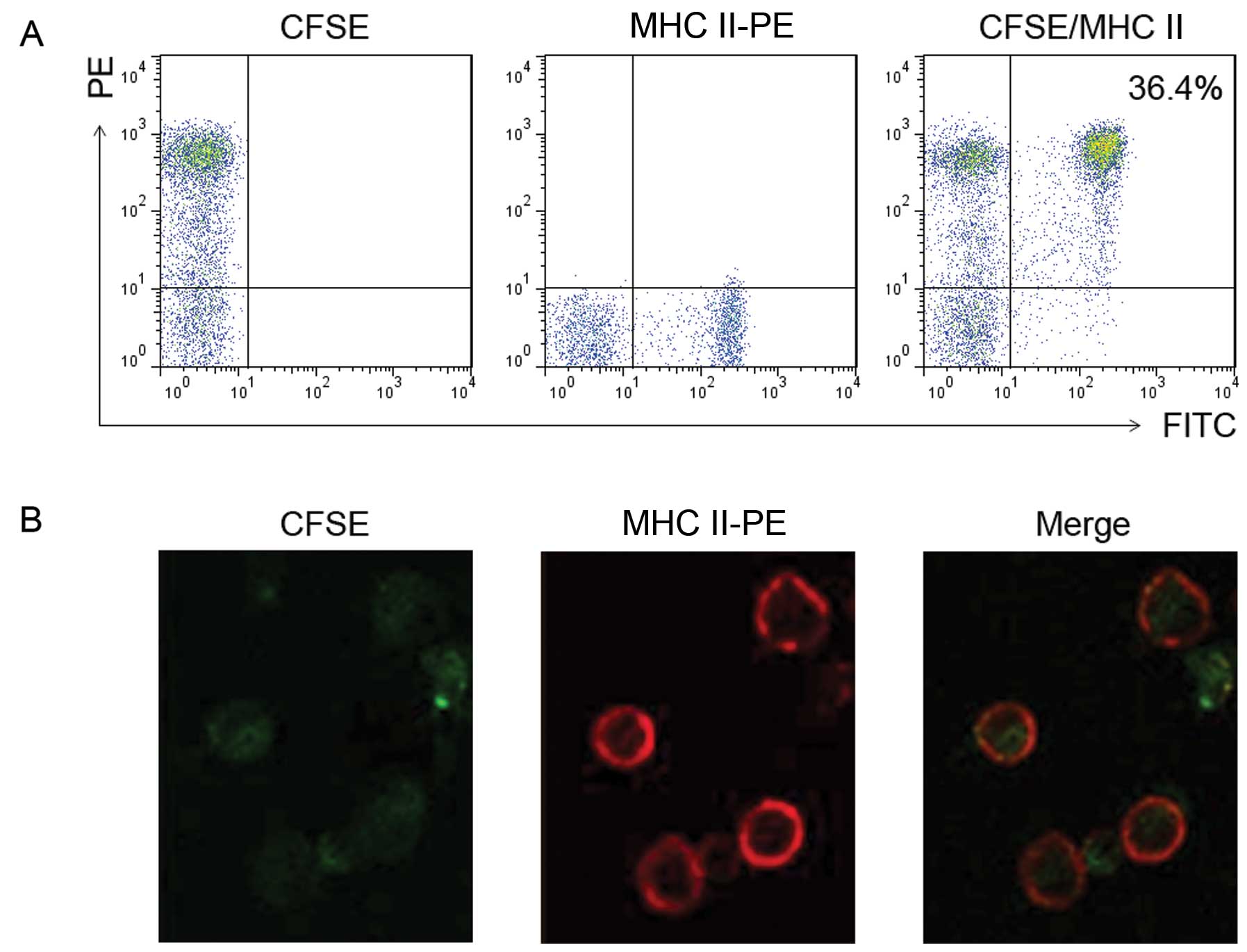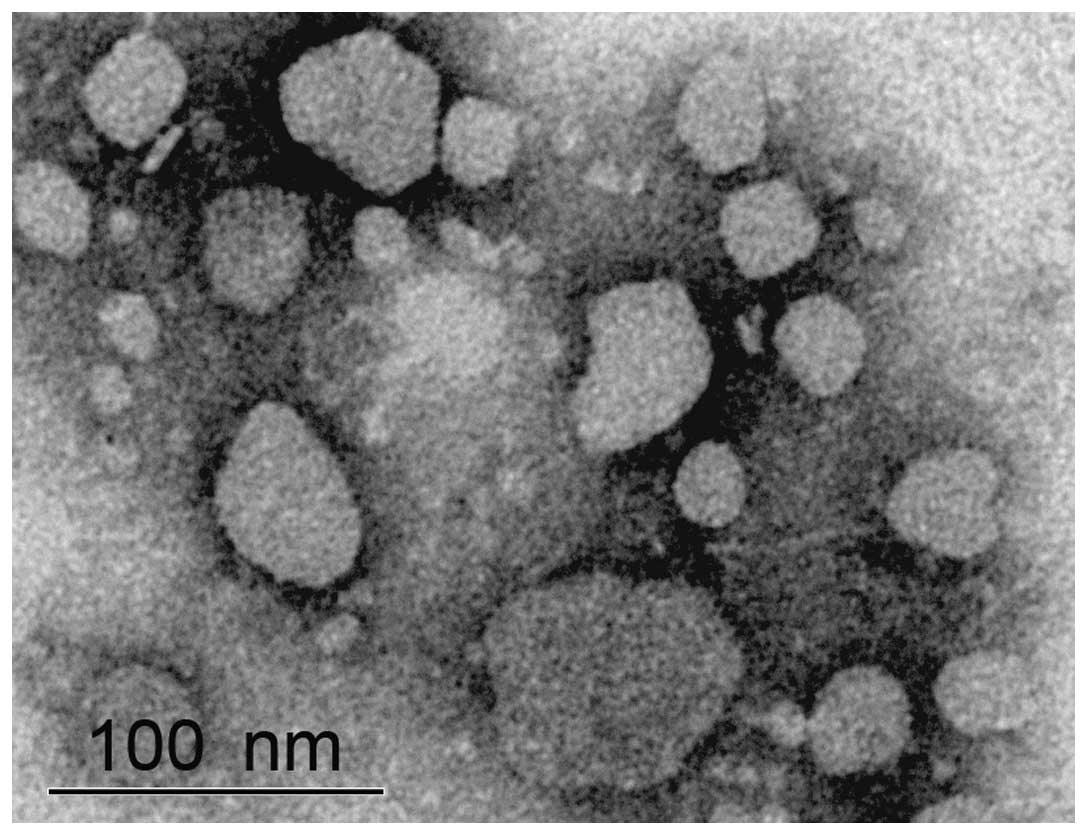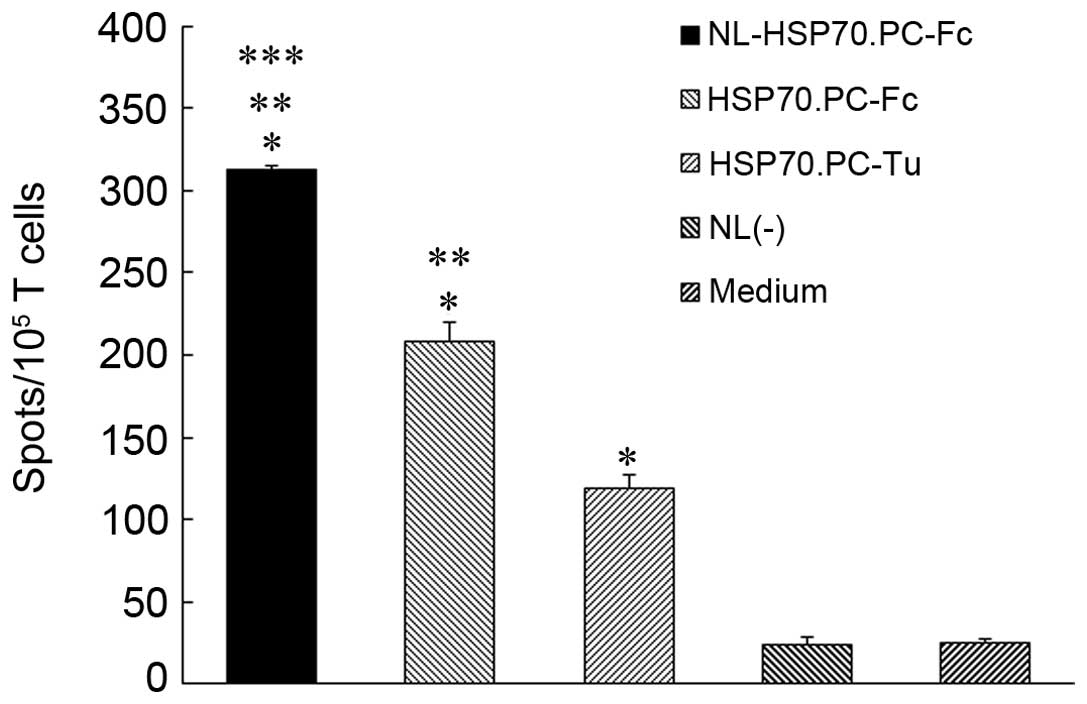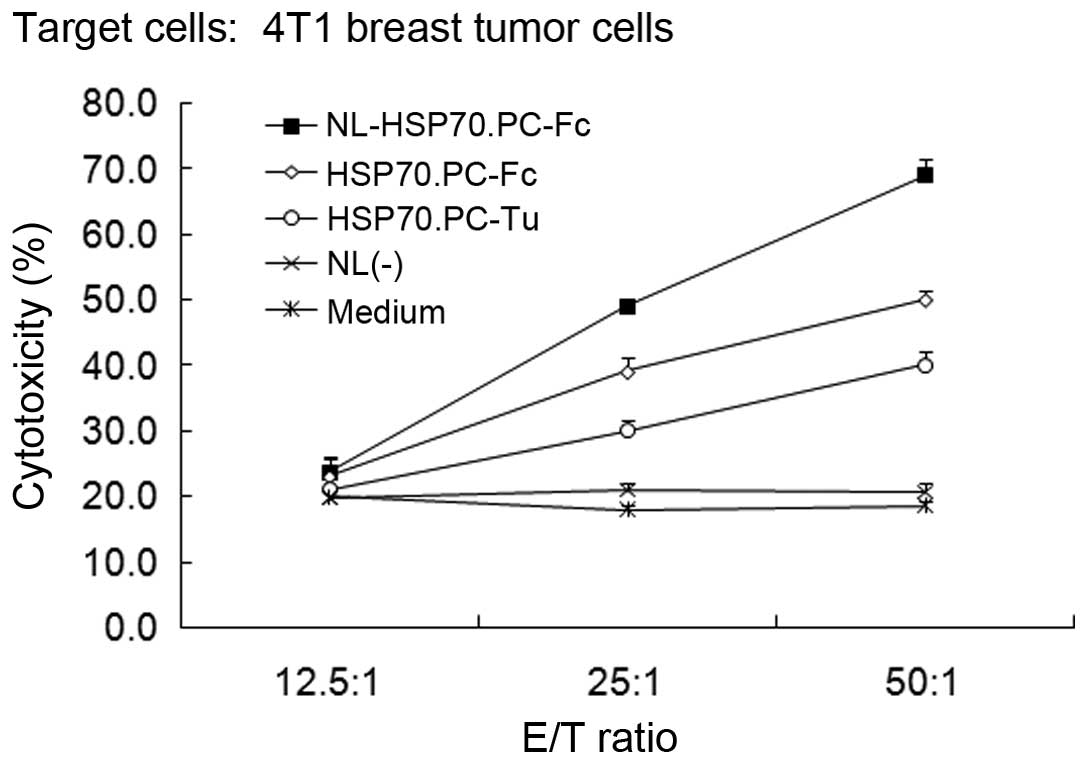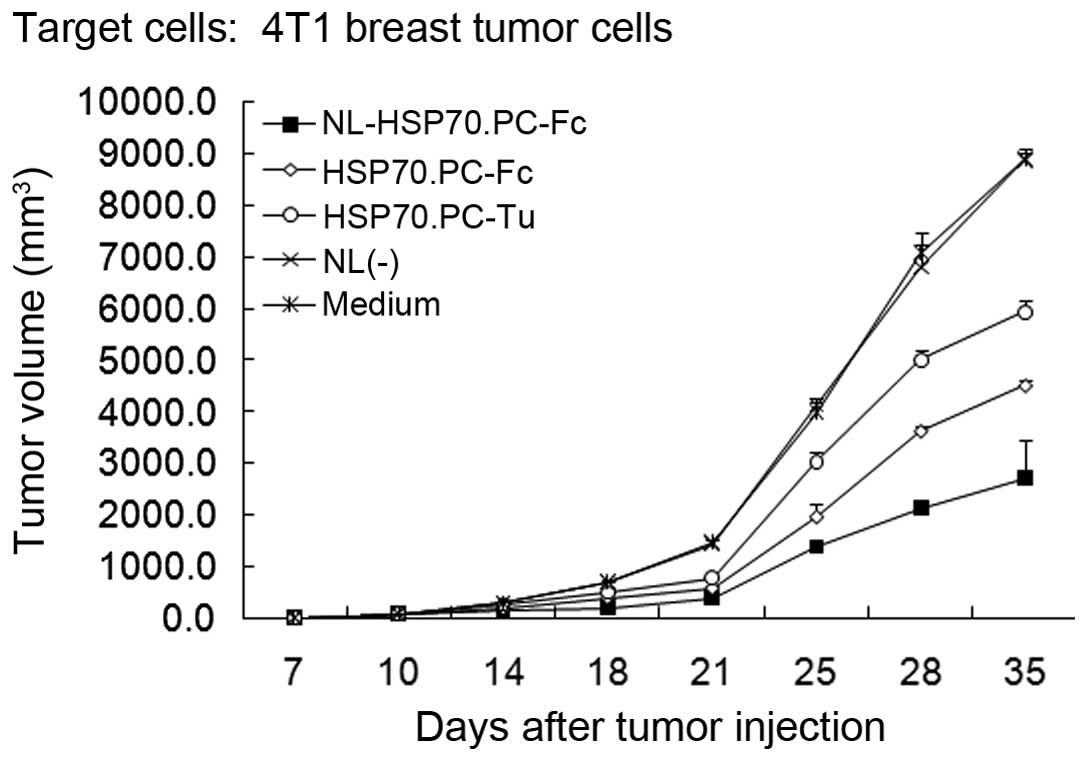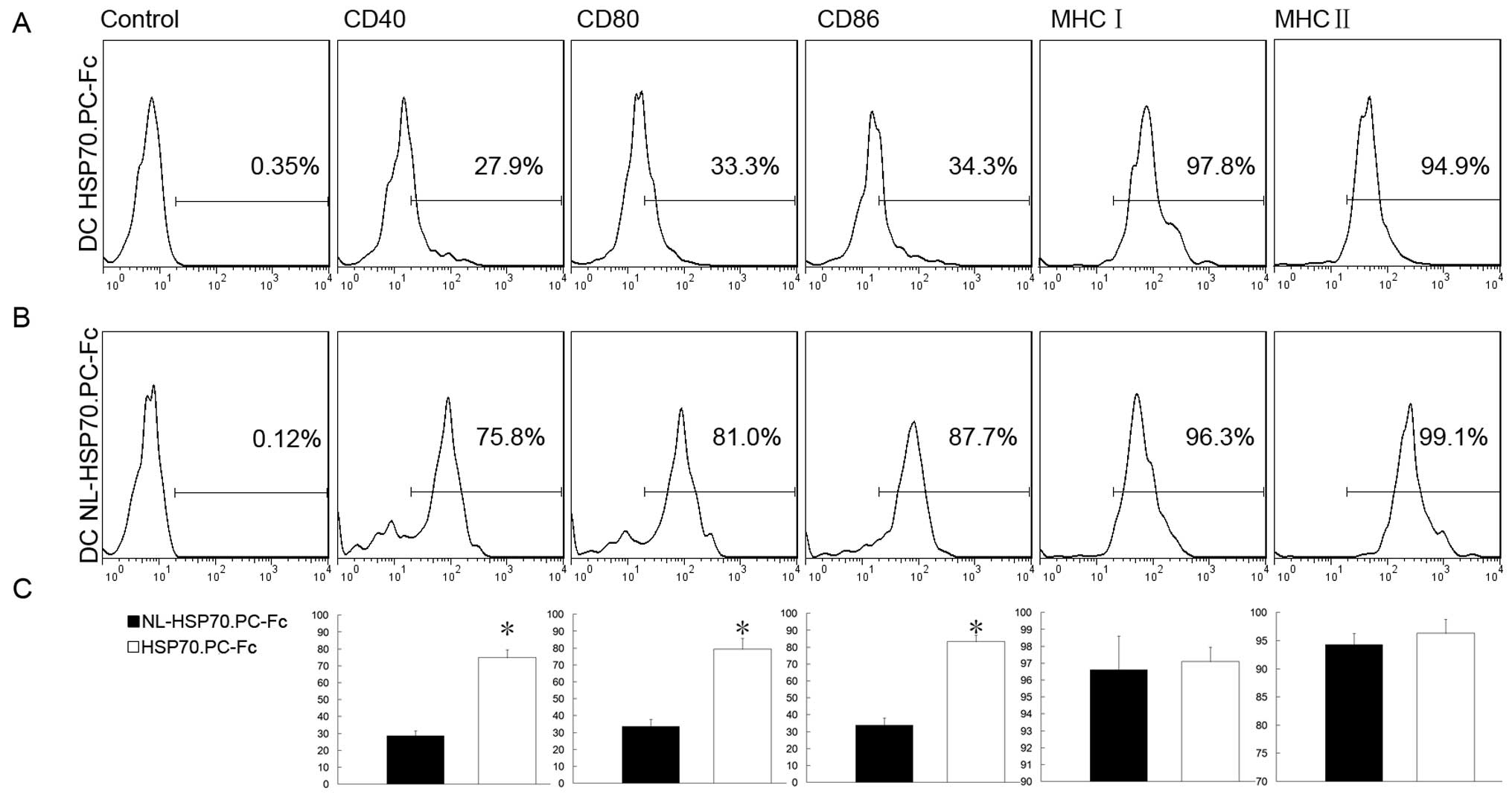|
1
|
Milani V, Noessner E, Ghose S, Kuppner M,
Ahrens B, Scharner A, Gastpar R and Issels RD: Heat shock protein
70: role in antigen presentation and immune stimulation. Int J
Hyperthermia. 18:563–575. 2002. View Article : Google Scholar
|
|
2
|
See AP, Pradilla G, Yang I, Han S, Parsa
AT and Lim M: Heat shock protein-peptide complex in the treatment
of glioblastoma. Expert Rev Vaccines. 10:721–731. 2011. View Article : Google Scholar : PubMed/NCBI
|
|
3
|
Murshid A, Gong J, Stevenson MA and
Calderwood SK: Heat shock proteins and cancer vaccines Developments
in the past decade and chaperoning in the decade to come. Expert
Rev Vaccines. 10:1553–1568. 2011. View Article : Google Scholar : PubMed/NCBI
|
|
4
|
Crane CA, Han SJ, Ahn B, Oehlke J, Kivett
V, Fedoroff A, Butowski N, Chang SM, Clarke J, Berger MS, et al:
Individual patient-specific immunity against high-grade glioma
after vaccination with autologous tumor derived peptides bound to
the 96 KD chaperone protein. Clin Cancer Res. 19:205–214. 2013.
View Article : Google Scholar
|
|
5
|
Shinagawa N, Yamazaki K, Tamura Y, Imai A,
Kikuchi E, Yokouchi H, Hommura F, Oizumi S and Nishimura M:
Immunotherapy with dendritic cells pulsed with tumor-derived gp96
against murine lung cancer is effective through immune response of
CD8+ cytotoxic T lymphocytes and natural killer cells.
Cancer Immunol Immunother. 57:165–174. 2008. View Article : Google Scholar
|
|
6
|
Tamura Y, Peng P, Liu K, Daou M and
Srivastava PK: Immunotherapy of tumors with autologous
tumor-derived heat shock protein preparations. Science.
278:117–120. 1997. View Article : Google Scholar : PubMed/NCBI
|
|
7
|
Sato K, Tonmoto Y, Tamura Y, Shindo M,
Shinzaki H, Hirai K and Kohgo Y: Immunotherapy using heat-shock
protein preparations of leukemia cells after syngeneic bone marrow
transplantation in mice. Blood. 98:1852–1857. 2001. View Article : Google Scholar : PubMed/NCBI
|
|
8
|
Snvastava PK: Immunotherapy of human
cancer: lessons from mice. Nat Immunol. 1:363–366. 2000. View Article : Google Scholar
|
|
9
|
Kojima T, Yamazaki K, Tamura Y, Ogura S,
Tani K, Konishi J, Shinagawa N, Kinoshita I, Hizawa N, Yamaguchi E,
et al: Granulocyte-macrophage colony-stimulating factor
gene-transduced tumor cells combined with tumor-derived gp96
inhibit tumor growth in mice. Hum Gene Ther. 14:715–728. 2003.
View Article : Google Scholar : PubMed/NCBI
|
|
10
|
Kovalchin JT, Murthy AS, Horattas MC,
Guyton DP and Chandawarkar RY: Determinants of efficacy of
immunotherapy with tumor-derived heat shock protein gp96. Cancer
Immun. 1:72001.
|
|
11
|
Teston A, Richards J, Whitman E, Mann GB,
Lutzky J, Camacho L, Parmiam G, Tosti G, Kirkwood JM, Hoos A, et
al: C-100-21 Study Group phase III comparison of vitespen, an
autologous tumor-derived heat shock protein gp96 peptide complex
vaccine, with physician’s choice of treatment for stage IV melanoma
the C-100-21 Study Group. J Clin Oncol. 26:955–962. 2008.
View Article : Google Scholar
|
|
12
|
Wood C, Snvastava P, Bukowski R, Lacombe
L, Gorelov AI, Gorelov S, Mulders P, Zielinski H, Hoos A,
Teofilovici F, et al: C-100-12 RCC Study Group an adjuvant
autologous therapeutic vaccine (HSPPC-96, vitespen) versus
observation alone for patients at high risk of recurrence after
nephrectomy for renal cell carcinoma A multicentre, open-label,
randomised phase III trial. Lancet. 372:145–154. 2008. View Article : Google Scholar : PubMed/NCBI
|
|
13
|
Gong J, Zhang Y, Durfee J, Weng D, Liu C,
Koido S, Song B, Apostolopoulos V and Calderwood SK: A heat shock
protein 70-based vaccine with enhanced immunogenicity for clinical
use. J Immunol. 184:488–496. 2010. View Article : Google Scholar :
|
|
14
|
Mensko-Liversidge E, Liversidge GG and
Cooper ER: Nanosizing: a formulation approach for
poorly-water-soluble compounds. Eur J Pharm Sci. 18:113–120. 2003.
View Article : Google Scholar
|
|
15
|
Moghimi SM, Hunter AC and Murray JC:
Long-circulating and target-specific nanoparticles theory to
practice. Pharmacol Rev. 53:283–318. 2001.PubMed/NCBI
|
|
16
|
Conniot J, Silva JM, Fernandes JG, Silva
LC, Caspar R, Brocchim S, Flonndo HF and Barata TS: Cancer
immunotherapy nanodehvery approaches for immune cell targeting and
tracking. Front Chem. 2:1052014. View Article : Google Scholar
|
|
17
|
Stark B, Andreae F, Mosgoeller W,
Edetsberger M, Gaubitzer E, Koehler G and Prassl R: Liposomal
vasoactive intestinal peptide for lung application protection from
proteolytic degradation. Eur J Pharm Biopharm. 70:153–164. 2008.
View Article : Google Scholar : PubMed/NCBI
|
|
18
|
Pulaski BA and Ostrand-Rosenberg S:
Reduction of established spontaneous mammary carcinoma metastases
following immunotherapy with major histocompatibility complex class
II and B71 cell-based tumor vaccines. Cancer Res. 58:1486–1493.
1998.PubMed/NCBI
|
|
19
|
Inaba K, Inaba M, Romam N, Aya H, Deguchi
M, Ikehara S, Muramatsu S and Steinman RM: Generation of large
numbers of dendritic cells from mouse bone marrow cultures
supplemented with granulocyte/macrophage colony-stimulating factor.
J Exp Med. 176:1693–1702. 1992. View Article : Google Scholar : PubMed/NCBI
|
|
20
|
Zhang Y, Luo W, Wang Y, Liu Y and Zheng L:
Purified dendritic cell-tumor fusion hybrids supplemented with
non-adherent dendritic cells fraction are superior activators of
antitumor immunity. PLoS One. 9:e867722014. View Article : Google Scholar : PubMed/NCBI
|
|
21
|
Zhang Y, Ma B, Zhou Y, Zhang M, Qiu X, Sui
Y, Zhang X, Ma B and Fan Q: Dendritic cells fused with allogeneic
breast cancer cell line induce tumor antigen-specific CTL responses
against autologous breast cancer cells. Breast Cancer Res Treat.
105:277–286. 2007. View Article : Google Scholar
|
|
22
|
Ryland LK, Doshi UA, Shanmugavelandy SS,
Fox TE, Aliaga C, Broeg K, Baab KT, Young M, Khan O, Haakenson JK,
et al: C6-ceramide nanohposomes target the Warburg effect in
chronic lymphocytic leukemia. PLoS One. 8:e846482013. View Article : Google Scholar
|
|
23
|
Chang YJ, Chang CH, Chang TJ, Yu CY, Chen
LC, Jan ML, Luo TY, Lee TW and Ting G: Biodistribution,
pharmacokinetics and microSPECT/CT imaging of 188Re-bMEDA-liposome
in a C26 murine colon carcinoma solid tumor animal model.
Anticancer Res. 27(4B): 2217–2225. 2007.PubMed/NCBI
|
|
24
|
Dadgar N, Alavi SE, Esfahani MK and
Akbarzadeh A: Study of toxicity effect of pegylated nanoliposomal
artemisinin on breast cancer cell line. Indian J Clin Biochem.
28:410–412. 2013. View Article : Google Scholar :
|
|
25
|
Bartlett GR: Phosphorus assay in column
chromatography. J Biol Chem. 234:466–468. 1959.PubMed/NCBI
|
|
26
|
Gao D, Tang S and Tong Q: Oleanolic acid
liposomes with polyethylene glycol modification Promising antitumor
drug delivery. Int J Nanomed. 7:3517–3526. 2012. View Article : Google Scholar
|
|
27
|
Rashid OM, Nagahashi M, Ramachandran S,
Dumur C, Schaum J, Yamada A, Terracina KP, Milstien S, Spiegel S
and Takabe K: An improved syngeneic orthotopic murine model of
human breast cancer progression. Breast Cancer Res Treat.
147:501–512. 2014. View Article : Google Scholar : PubMed/NCBI
|
|
28
|
Noessner E, Gastpar R, Milani V, Brandi A,
Hutzier PJ, Kuppner MC, Roos M, Kremmer E, Asea A, Calderwood SK,
et al: Tumor-derived heat shock protein 70 peptide complexes are
cross-presented by human dendritic cells. J Immunol. 169:5424–5432.
2002. View Article : Google Scholar : PubMed/NCBI
|
|
29
|
Castelli C, Ciupitu AM, Rim F, Rivoltim L,
Mazzocchi A, Kiesshng R and Parmiam G: Human heat shock protein 70
peptide complexes specifically activate antimelanoma T cells.
Cancer Res. 61:222–227. 2001.PubMed/NCBI
|
|
30
|
Zhang Y and Zheng L: Tumor immunotherapy
based on tumor-derived heat shock proteins (Review). Oncol Lett.
6:1543–1549. 2013.PubMed/NCBI
|
|
31
|
Tosti G, Cocorocchio E, Pennacchioli E,
Ferrucci PF, Teston A and Martinoli C: Heat-shock proteins-based
immunotherapy for advanced melanoma in the era of target therapies
and lmmunomodulating agents. Expert Opin Biol Ther. 14:955–967.
2014. View Article : Google Scholar : PubMed/NCBI
|
|
32
|
Hamman JH and Enslin GM: Kotzé AF Oral
delivery of peptide drugs barriers and developments. BioDrugs.
19:165–177. 2005. View Article : Google Scholar
|
|
33
|
Vyas SP and Gupta PN: Implication of
nanoparticles/microparticles in mucosal vaccine delivery. Expert
Rev Vaccines. 6:401–418. 2007. View Article : Google Scholar : PubMed/NCBI
|
|
34
|
Berinstein NL, Karkada M, Morse MA,
Nemunaitis JJ, Chatta G, Kaufman H, Odunsi K, Nigam R, Sammatur L,
MacDonald LD, et al: First-in-man application of a novel
therapeutic cancer vaccine formulation with the capacity to induce
multi-functional T cell responses in ovarian, breast and prostate
cancer patients. J Transl Med. 10:1562012. View Article : Google Scholar : PubMed/NCBI
|
|
35
|
Ge W, Hu PZ, Huang Y, Wang XM, Zhang XM,
Sun YJ, Li ZS, Si SY and Sui YF: The antitumor immune responses
induced by nanoemulsion-encapsulated maGe1-HSP70/Sea complex
protein vaccine following different administration routes. Oncol
Rep. 22:915–920. 2009.PubMed/NCBI
|
|
36
|
Ge W, Li Y, Li ZS, Zhang SH, Sun YJ, Hu
PZ, Wang XM, Huang Y, Si SY, Zhang XM, et al: The antitumor immune
responses induced by nanoemulsion-encapsulated maGe1-HSP70/Sea
complex protein vaccine following peroral administration route.
Cancer Immunol Immunother. 58:201–208. 2009. View Article : Google Scholar
|
|
37
|
Gabizon A and Papahadjopoulos D: Liposome
formulations with prolonged circulation time in blood and enhanced
uptake by tumors. Proc Natl Acad Sci USA. 85:6949–6953. 1988.
View Article : Google Scholar : PubMed/NCBI
|
|
38
|
Nakase I, Lai H, Singh NP and Sasaki T:
Anticancer properties of artemisinin derivatives and their targeted
delivery by transferrin conjugation. Int J Pharm. 354:28–33. 2008.
View Article : Google Scholar
|
|
39
|
Veronese FM: Peptide and protein
PEGylation: a review of problems and solutions. Biomaterials.
22:405–417. 2001. View Article : Google Scholar : PubMed/NCBI
|
|
40
|
Ryan SM, Mantovani G, Wang X, Haddleton DM
and Brayden DJ: Advances in PEGylation of important biotech
molecules: Delivery aspects. Expert Opin Drug Deliv. 5:371–383.
2008. View Article : Google Scholar : PubMed/NCBI
|
|
41
|
Matteucci ML and Thrall DE: The role of
liposomes in drug delivery and diagnostic imaging: a review. Vet
Radiol Ultrasound. 41:100–107. 2000. View Article : Google Scholar : PubMed/NCBI
|
|
42
|
Pedroso de Lima MC, Neves S, Filipe A,
Düzgüneş N and Simões S: Cationic liposomes for gene delivery: From
biophysics to biological applications. Curr Med Chem. 10:1221–1231.
2003. View Article : Google Scholar : PubMed/NCBI
|
|
43
|
Bakker-Woudenberg IA, Storm G and Woodle
MC: Liposomes in the treatment of infections. J Drug Target.
2:363–371. 1994. View Article : Google Scholar : PubMed/NCBI
|
|
44
|
Im SA, Kim KH, Ji HG, Yu HG, Park SK and
Lee CK: Nanoliposomes of L-lysine-conjugated poly (aspartic acid)
Increase the Generation and Function of Bone Marrow-derived
Dendritic Cells. Immune Netw. 11:281–287. 2011. View Article : Google Scholar : PubMed/NCBI
|















